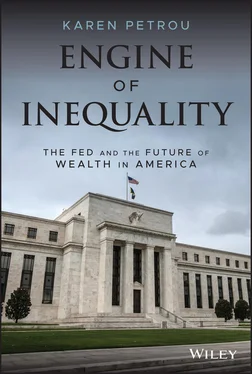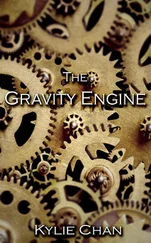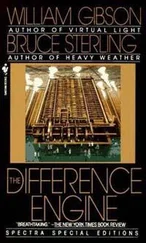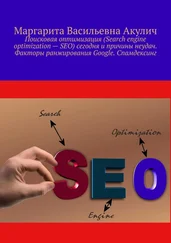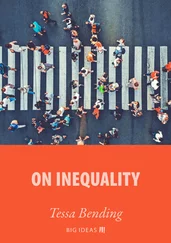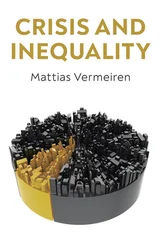In 2008, the financial system collapsed suddenly and, to many regulators and central bankers, seemingly without warning. The “great financial crisis” that ensued wrought havoc, but by 2010 the financial system stabilized and stock markets began their upward climb. By 2013, the Federal Reserve was confident that the “Great Recession” that followed the great financial crisis had ended, with financial markets also well on their way to becoming bulletproof thanks to tough new banking rules. The US central bank thus proclaimed that all was right with the national economy and financial system even though only a tiny percentage of Americans benefit from rising financial markets, underemployment was endemic, and anyone who tried to save his or her way to a better life lost ground every day due to ultra-low interest rates.
The Obama Administration also congratulated itself on the sound economy and resilient financial system, Hillary Clinton campaigned on renewed prosperity, Americans knew more than economists about their own struggles, Donald Trump won, markets climbed higher, economic growth remained weak, and America grew ever angrier as economic inequality rose even higher. By 2020, COVID blew away every one of the foundations on which the Fed thought the economy and financial system so securely rested. A decade of rising financial markets atop acute economic and racial inequality made the US as vulnerable to an economic shock as an ill-kempt nursing home to the coronavirus.
I'm among the Americans who got angrier and angrier from 2010 to 2020 as America became increasingly unequal while well-intentioned policy-makers assured us that, as the Fed likes to say, the US economy was in a “good place.” In my day job, I analyze monetary and regulatory policy to assess its strategic impact on financial-services companies and markets, doing so for major corporations, central banks, and those elsewhere in the financial market who make or lose money based on what policy-makers do. This isn't exactly a job in the inequality trenches, but it does afford a unique perspective on the totally perverse effect of post-2008 financial policy: acute inequality and resulting risks to both growth and financial stability.
As the 2016 campaign began, I also saw another consequence of post-crisis financial policy: voter fury about the deaf ear most financial decision-makers gave to the warp-speed disintegration of the American middle class, economic despair in communities of color, and profound distrust across what was once the US's manufacturing and agricultural heartland. Calls resonated for policies founded on populism, nativism, and even racism – calls that turned out to be clarion to all too many because vast swaths of the US were in acute economic distress no matter the aggregate growth and employment numbers with which the Federal Reserve comforted itself.
Because my nature is one of an analyst, not an advocate, I dove into the data. As you'll see from all of it in this book, the more one knows the hard facts of financial policy's inequality impact, the angrier one becomes. I thus switched into advocate mode.
In 2016, I told a group of global central bankers that income inequality is the battlefield casualty of post-crisis reform, 1 urging them to clean up their own mess, not count on changes to taxation, spending, technology, or other policies somehow to do it for them. The central bankers were receptive, but none acted. Inequality then climbed higher as post-2008 monetary and regulatory policy continued unchanged, leading me in another speech to central bankers in 2018 to make a still more forceful case for rapid financial-policy reform. 2 Again, central bankers listened but did no more.
This book is my answer to all that inaction, an answer made still more angry and urgent by America in the wake of the pandemic. If more small businesses had been able to access sound credit before COVID, then many fewer would have closed and many more lower-income jobs would have survived. If most Americans had been able to put aside some savings, then families wouldn't have run to food pantries in still-untold numbers. If policy-makers had seen the extent to which the Fed's vaunted recovery stopped far short of people and businesses of color, then the fury following George Floyd's murder would have focused solely on racial justice, not also on demands to “eat the rich.” If financial institutions – not just banks – had been properly regulated, then Americans wouldn't have been so deeply in debt and the financial system wouldn't have crumpled the first day COVID's force was felt. And if the Fed hadn't immediately rushed in to rescue all this risk-taking, then Americans of wealth wouldn't have become so much richer so much faster even as US unemployment numbers reached heights not seen since the Great Depression.
Economic inequality is not a curse that afflicts America because some people just don't try hard enough or even because some politicians just don't care enough. This book – the first to do so – will show that US income and wealth inequality grew worse faster than ever before after 2010 due to the one thing that dramatically changed that year: the way the Federal Reserve set monetary and regulatory policy. As you will see, there is a clear and causal connection between financial policy and economic inequality and breaking it is desirable, feasible, politically achievable, and meaningful as a near-term equality remedy.
It might seem fanciful to target financial policy – after all, most of us don't even follow financial policy, let alone feel its impact in our daily lives. However, the interest rates we get at the bank or pay on our debt, the returns some of us achieve in the stock market, the financial companies we choose or are forced to do business with, and even the wages we get are the result of financial policy. As a result, financial policy controls key turbines in the inequality engine.
Financial policy is the combination of the monetary policy dictated by the Federal Reserve Board and the rules written by the Fed and financial regulators. Although ignored by most assessments of economic inequality, financial policy sets the speed and direction of the inequality engine because the inequality engine's fuel is money and no policy moves money with more force than financial policy. When the US economy largely depended on manufacturing and agriculture, financial policy moved the inequality engine, but only a little in comparison to other causes of American economic inequality such as tax or trade policy. But when an economy is “financialized” – i.e., when growth depends in large part on financial activities, not real production – financial policy is an inequality engine unto itself. The US is a financialized economy and financial policy is thus a potent inequality force.
In the US, money thus moves where monetary and regulatory policy drives it. And ever since the great financial crisis, policy drove money to take ever more speculative bets in financial markets that know neither risk nor bounds thanks again to financial policy. How could it have been that, the day in April 2020 that the US announced then-record COVID deaths, the S&P 500 finished its best week since 1974? As this book will show in detail, one need look no farther than the Fed, which that day also stepped in with trillions to backstop even the riskiest investments.
It's thus clear that money determines an economy's haves and have-nots, but how does the inequality engine powered by money work? First, the engine analogy encapsulates the lesson in the Gospel of St. Matthew: “For unto every one that hath shall be given, and he shall have abundance: but from him that hath not shall be taken away even that which he hath” (Matthew 25:29).
This scriptural injunction is in a parable some scholars read as an assessment of spiritual growth, but it aptly describes the critical finding in Thomas Piketty's magisterial analysis of economic inequality: 3 when financial rates of return are above that of broader economic growth, inequality speeds up in a cumulative way, just like a gassed-up engine driven by someone with a heavy foot on the pedal.
Читать дальше
